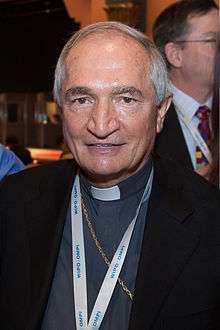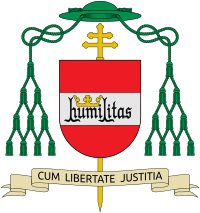Silvano Maria Tomasi
Silvano Maria Tomasi C.S. (born 12 October 1940) is a Catholic Archbishop. He was the Permanent Observer of the Holy See to the United Nations in Geneva until 13 February 2016.
Silvano Tomasi | |
|---|---|
 Archbishop Tomasi at WIPO Diplomatic Conference on the Treaty for the Blind in Marrakech | |
| Appointed | 10 June 2003 |
| Term ended | 13 February 2016 |
| Predecessor | Diarmuid Martin |
| Successor | Ivan Jurkovič |
| Orders | |
| Ordination | 31 May 1965 |
| Consecration | 17 August 1996 by Angelo Sodano |
| Personal details | |
| Birth name | Silvano Maria Tomasi |
| Born | 12 October 1940 Casoni di Mussolente, Italy |
| Nationality | Italian |
| Denomination | Roman Catholic |
| Alma mater | Fordham University |
| Coat of arms |  |
| Styles of Silvano Tomasi | |
|---|---|
 | |
| Reference style | The Most Reverend |
| Spoken style | Your Excellency |
| Religious style | Archbishop |
Early life
He was born in Casoni di Mussolente, Italy. On 31 May 1965 he was ordained as priest of the Congregation of the Missionaries of St. Charles. He earned his Ph.D. in sociology from Fordham University. He co-founded the Center for Migration Studies, a think tank based in New York, and wrote a book on the historic legacy of New York's Italian parishes.
On 27 June 1989 Pope John Paul II appointed him Secretary of the Pontifical Council for Pastoral Care of Migrants and Itinerant Peoples. He was named titular Archbishop of Cercina and Apostolic Nuncio to Eritrea and Ethiopia on 27 June 1996, consecrated on 17 August 1996, and transferred to the titular see of Acelum. In addition to those responsibilities, he was appointed Apostolic Nuncio to Djibouti on 23 December 2000.[1]
Geneva role
On 10 June 2003, Tomasi was appointed Permanent Observer of the Holy See to the United Nations in Geneva.[2]
He was widely criticised in September 2009 following a speech in which he praised the Church's record on child sex abuse in comparison with that of other organisations by arguing that "Of all priests involved in the abuses, 80 to 90 percent belong to this sexual orientation minority which is sexually engaged with adolescent boys between the ages of 11 and 17" and "As the Catholic church has been busy cleaning its own house, it would be good if other institutions and authorities, where the major part of abuses are reported, could do the same and inform the media about it."[3][4]
Tomasi "encouraged passage of an international protocol that would give children a direct line of communication to local and international authorities when they are victims of violence or their rights are violated.... Tomasi...said the measure "will become a significant instrument of the human rights system." The document would add to the protections provided in the United Nations Convention on the Rights of the Child. Speaking on 8 June 2011 at the U.N. International Labor Conference in Geneva, Archbishop Tomasi urged that all involved in "the burgeoning and mercurial economic system" work to foster fundamental principles that ensure respect for the common good and protection of the most vulnerable.[5]
In 2014 the U.N. Committee on the Rights of the Child issued a report[6] described as "a scathing indictment of the Vatican’s handling of child sexual abuse cases involving clerics, releasing a report that included criticism of church teachings on homosexuality, gender equality and abortion"[7] which was seen as an indictment of the Catholic Church's handling of child sexual abuse cases involving clerics, going beyond how the church managed abuse allegations to include criticism of its teachings on homosexuality, gender equality and abortion. Archbishop Tomasi appeared before a U.N. committee in Geneva. Vatican officials said they were still studying the findings, but responded angrily to what they described as recommendations that were ideologically biased. Fr Thomas Rosica said that the U.N. report wrongly looked at Catholicism as a single organisation.[7] Tomasi said that he suspected pro-gay rights NGOs had influenced the committee and "reinforced an ideological line" in the UN.[8]
No matter how sophisticated autonomous weapons systems are, they can never comply with international human rights law. "Meaningful human involvement is absolutely essential in decisions affecting the life and death of human beings," Archbishop Tomasi, told experts meeting 13–16 May to discuss lethal autonomous weapons systems such as drones. Archbishop Tomasi said it was essential "to recognise that autonomous weapon systems can never replace the human capacity for moral reasoning, including in the context of war." "The development of autonomous weapon systems will ultimately lead to widespread proliferation," he said, and "the development of complex autonomous weapon systems which remove the human actor from lethal decision-making is short-sighted and may irreversibly alter the nature of warfare in a less humane direction, leading to consequences we cannot possibly foresee, but that will in any case increase the dehumanisation of warfare."[9]
Speaking to Vatican Radio in August 2014 Archbishop Tomasi commented that "Maybe military action is necessary at this moment" in Iraq.[10][11] He told Vatican Radio that "what seems to be particularly important in the letter of the Holy Father to Ban Ki-moon is the expressions that he uses: the tragic situation 'compels' the international community. There is a moral imperative, so to (speak), a necessity to act." He added that the UN charter notes that at times "dialogue, negotiations, fail and large numbers of people find themselves at risk: at risk of genocide, at risk of having their fundamental, their basic human rights violated. In this case, when every other means has been attempted, article 42 of the Charter of the United Nations becomes possible justification for not only imposing sanctions of economic nature on the state or the group or the region that violates the basic human rights of people, but also to use force. All the force that is necessary to stop this evil and this tragedy."[12]
In 2015 Archbishop Tomasi said jihadists were committing "genocide" and must be stopped. He said: "What's needed is a co-ordinated and well-thought-out coalition to do everything possible to achieve a political settlement without violence. But if that's not possible, then the use of force will be necessary." He added: "We have to stop this kind of genocide. Otherwise we'll be crying out in the future about why we didn't so something, why we allowed such a terrible tragedy to happen."[13][14]
Tomasi retired upon the announcement of the appointment of his successor in Geneva on 13 February 2016.[15]
References
- "Rinunce e Nomine, 23.12.2000" (Press release) (in Italian). Holy See Press Office. 23 December 2000. Retrieved 19 July 2019.
- "Rinunce e Nomine, 10.06.2003" (Press release) (in Italian). Holy See Press Office. 10 June 2003. Retrieved 19 July 2019.
- Butt, Riazat (28 September 2009). "Sex abuse rife in other religions, says Vatican". The Guardian.
- Rothkopf, David (1 October 2009). "Foreign Policy: The Vatican And Child Abuse". NPR.
- Faiola, Anthony; Boorstein, Michelle (5 February 2014). "U.N. panel blasts Vatican handling of clergy sex abuse, church teachings on gays, abortion". Washington Post. Retrieved 26 November 2015.
- "Vatican envoy rejects UN panel's critical verdict on clerical abuse scandal". The Guardian (UK). 5 February 2014. Retrieved 26 November 2015.
- Wooden, Cindy (15 May 2014). "Vatican official voices opposition to automated weapons systems". Catholic Herald.
- "Islamic State: Vatican backs using military force". BBC News. 15 March 2015.
- Allen Jr., John L. (13 March 2015). "Vatican backs military force to stop ISIS 'genocide'". Crux.
- Harris, Elise (15 February 2016). "Pope Francis Names New Permanent Observer to the UN in Geneva". National Catholic Register. Retrieved 19 July 2019.
External links
| Diplomatic posts | ||
|---|---|---|
| Preceded by Diarmuid Martin |
Permanent Observer of the Holy See to the United Nations in Geneva 10 June 2003 – 2016 |
Succeeded by Ivan Jurkovič |